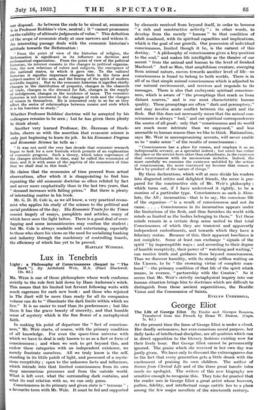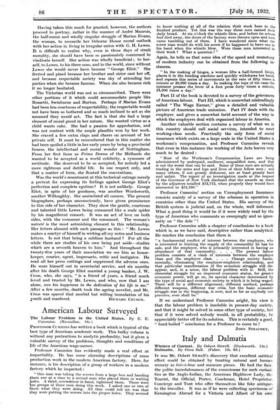George Eliot
AT the present time the fame of George Eliot is under a cloud. Her deadly seriousness, her ever-conscious moral purpose, her daily tasks of intellectual discipline, are all qualities which run in direct opposition to the literary fashions existing now for their lively hour. But George Eliot cannot be permanently ignored. The praise which she received in her own day was justly given. We have only to discount the extravagances due to the fact that every generation gets a little drunk with the excitement of praising its own children. The author of Scenes from Clerical Life and of the three great bucolic tales needs no apologist. The writers of this new biography are sensitive enough to recognize this. They take for granted that the reader sees in George Eliot a great artist whose humours pathos, fidelity, and intellectual range entitle her to a place among the few major novelists of the nineteenth century.
Having taken this much for granted, however, the authors proceed to portray, rather in the manner of Andre Maurois, the half-comic and wholly singular struggle of Marian Evans, the woman, to reconcile her Osborne House moral outlook with her action in living in irregular union with G. H. Lewes.
It is difficult to realize why, even in those days of strait morality, she should have been so passionately concerned to vindicate herself. Her action was wholly beneficial ; to her- self, to Lewes, to his three sons, and to the world, since without Lewes she would never have become " George Eliot." She fretted and pined because her brother and sister cast her off, and because respectable society was shy of attending her parties when she became famous. When she also became rich it no longer hesitated.
The Victorian world was not so circumscribed. There were other portions of it which could accommodate people like Rossetti, Swinburne and Burton. Perhaps if Marian Evans had been less courteous of respectability, the respectable would not have been so bothered and so much inclined to act as she assumed they would act. The fact is that she had a large element of moral greed in her nature. She wanted virtue as a child wants cake. She had a passion for approbation, and was not content with the ample plaudits won by her work. She craved a few extra claps and cheers on account of her private self. It must be remembered that in this matter she had been spoiled a little in her early years by being a provincial lioness, the intellectual and moral wonder of Nottingham. From her first fame as Prima Donna of the Midlands she wanted to be accepted as a world celebrity, a cynosure of rectitude. She deserved to be so accepted, for nobody led a more righteous and dutiful life. In one respect only, and that a matter of form, she flouted the conventions.
Was the world's resentment at this technical outrage merely a pretext for expressing its feelings against George Eliot's perfection and complete egotism ? It is not unlikely. George Eliot, in spite of her goodness, was another Wordsworth, another Willoughby. She assimilated all comers. The present biographers, perhaps unconsciously, have given prominence to this side of her character. They show the gentle, courteous and talented little Lewes being consumed like a male spider by his magnificent consort. It was an act of love on both sides, with the consumer and the consumed. The woman's naIvete is the most astonishing element in this relationship. Her letters abound with such passages as this : " Mr. Lewes makes a martyr of himself in writing all my notes and business letters. Is not that being a sublime husband ? For all the while there are studies of his own being put aside—studies which are a seventh heaven to him." And throughout the twenty-five years of their association we see him as house- keeper, courier, agent, impresario, critic and instigator. He read all her press cuttings and suppressed the adverse ones. He wore himself out in secretarial service, and six months after his death George Eliot married a young banker, J. W. Cross, who, she says, " is a friend of years, a friend much loved and trusted by Mr. Lewes, and who, now that I am alone, sees his happiness in the dedication of his life to me." After a few months, death took the ageing novelist, and Mr. Cross was spared that morbid but willing immolation of his



































 Previous page
Previous page